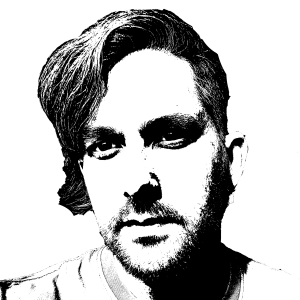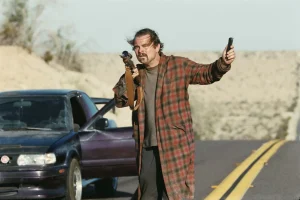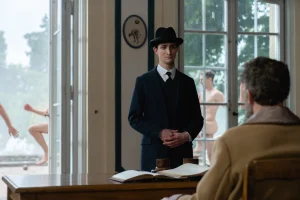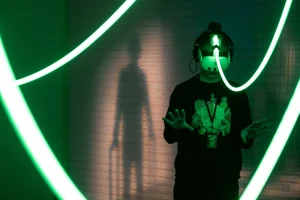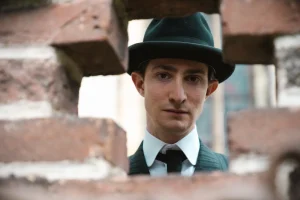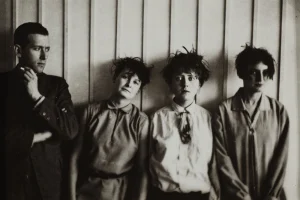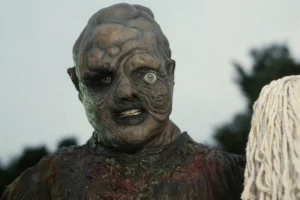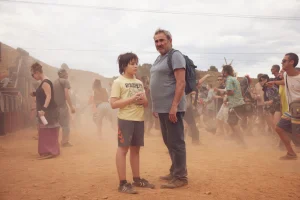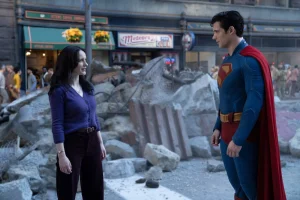In a new documentary opening later this month, Czech director Robin Kvapil takes a profound approach to confronting pro-Russian disinformation. Change My Mind (Velký vlastenecký výlet) follows three Czechs sympathetic to Russia’s war in Ukraine as they travel from Prague to the front lines, meeting soldiers, visiting destroyed cities, and standing at mass graves.
The 95-minute film, produced by Punk Film in cooperation with Czech Television and entities in Slovakia and Ukraine, is set to premiere in Czech cinemas on August 21—chosen to coincide with the anniversary of the 1968 Soviet-led invasion of Czechoslovakia. Kvapil frames the journey as a modern-day echo of that historical event, opening the film with a reminder that “Russia is leading a disinformation war against the whole of Europe.”
The three participants—Petra, Ivo, and Nikola—were selected from 60 applicants who responded to Kvapil’s open call for those skeptical of mainstream reporting on the war. They were not actors, but real individuals who had expressed unwavering support for Russia and suspicion toward Ukrainian accounts of the conflict. According to the director, his intent was not to change their minds, but to document their confrontation with reality.
“I’m not a naive fool to believe in the strength of films changing society,” Kvapil told AFP. “But I think this one can do some good.”
From casting call to combat zone
Before filming began, Kvapil made two research trips to Ukraine to prepare for the logistical and security challenges. The shoot itself required cooperation from the Czech Interior Ministry and the Security Service of Ukraine. A 20-member crew traveled with the group, joined by a criminologist, a psychiatrist, and a translator-guide familiar with the region.
The route took the group from Prague to Kharkiv, Izyum, the Donbas, and back through Kyiv and Lviv. Along the way, the participants filmed their own experiences, some of which were included unedited in the final cut. The journey often took them into areas where incoming missile alerts allowed only seconds to seek cover. “In Kharkiv, you have about thirty seconds from the alarm to impact—most of the time, you can’t make it to safety,” Kvapil said.
Locations included mass graves in Izyum, a city occupied by Russian forces in early 2022 and later retaken by Ukraine. While Ukrainian officials reported finding more than 440 graves there, Petra dismissed the site as staged propaganda. “I know why this place feels so weird—because it’s all fake!” she declared in one of the film’s most jarring moments.
Producer Jakub Drocár recalled the surreal contrast between daily life and constant danger. “You could have a latte with avocado toast in the morning in Kharkiv, but in the background, you’d hear artillery fire,” he told Czech media. “I felt enormous responsibility for the safety of the crew, and deep respect for Ukrainians who are living and surviving under these conditions.”
A confrontation without resolution
Rather than delivering a straightforward account of the war, Change My Mind juxtaposes the devastation on the ground with the unshaken convictions of its central figures. The documentary unfolds like a road movie, charting not just the physical journey but the ideological impasse between reality and belief.
Ivo openly calls himself a “conspiracy nut” and admits to believing information online “even if it’s not true.” Nikola praises Russian President Vladimir Putin as “the only man who can stop the Western ideological madness.” Petra, whose parents were hardline communists, maintains that the war is “nonsense” despite witnessing destroyed neighborhoods and speaking with Ukrainian civilians.
The film’s Czech title Velký vlastenecký výlet—literally The Great Patriotic Trip—is a pointed reference to Russia’s term for World War II, The Great Patriotic War. Kvapil uses the irony to underscore the gulf between the participants’ self-image as truth-seekers and the realities they encounter.
While some moments capture visible discomfort—such as when the group is caught in an air raid—none of the three return with a changed perspective. “I still have the same opinion,” Ivo says in the film’s closing scenes. Petra insists she has “not been reeducated.”
For Kvapil, the persistence of their beliefs was part of the point. “I’m not naive enough to think a film will change society,” he told AFP. “But maybe it can do some good by showing what happens when disinformation meets reality head-on.”
The production amassed roughly 140 hours of footage, edited down over six months by Libor Alexa. Cinematographer Prokop Souček and sound designer Martin Tauber worked under challenging conditions, often with limited GPS and unstable communications. The finished film resists sensationalism, instead presenting the participants’ words and reactions without overt editorializing.
The release date’s symbolic connection to 1968 adds an additional layer of meaning for Czech audiences, linking past and present Russian aggression. In an era when disinformation remains a persistent challenge—last year, one-third of Czechs reported believing false information at least once, according to Ipsos—Change My Mind offers a rare, unsettling glimpse into the resilience of conviction in the face of undeniable evidence.
Lead photo: Still from Change My Mind (2025) © Stanislav Krupař / Bontonfilm


